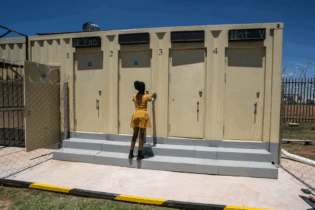A Water Research Commission (WRC) study confirms that communities with low socio-economic status, based on income, education and housing type are most vulnerable to climate change as they do not have the capacity or resources to protect themselves or their properties from possible impacts. This emanated from a WRC research project contracted by the Centre for Water Resources Research (CWRR) at the University of KwaZulu-Natal (UKZN).
Environmental hydrologist, Sabine Stuart-Hill, of the CWRR presented the research findings at the 16th National Hydrology Symposium, held in Pretoria.The project aimed to, firstly, identify which communities are most sensitive to climate change due to their socio-economic status; secondly, investigate how able those communities are to respond to the risks imposed on them; and thirdly, define what the risks are that these communities are most exposed to. The importance of a community’s ability to make informed decisions about the risk climate change imposes on them and their ability to use this information to protect themselves against the threats, or react and recover from the effects of the threats. “People who are directly dependent on resources around them are more likely to be affected by any changes in the availability and distribution of those resources,” said Stuart-Hill. Those living next to a river, for example, are at greater risk to increased runoff and flooding. The research was done on the Mgeni catchment, in KwaZulu-Natal, where a projected increase in annual rainfall is predicted; and the Berg catchment, in the Western Cape, where decreases in annual rainfall is predicted. The Mgeni catchment includes two major cities, Pietermaritzburg and Durban, while the Berg catchment includes Cape Town. Both catchments comprise a mixture of land uses, including urban settlement, rural areas, subsistence and commercial farming as well as various open spaces to degraded areas.Both catchments have high-density settlements characterising urban settlement patterns, implying that a large number of people, living in a relatively small area, are vulnerable to climate change impacts. “Urban migration may have a negative effect on people’s ability to adapt to climate change as they experience disruptions in social structure and lose traditional practices,” explained Stuart-Hill. “This presents a challenge to city managers and decision-makers to help protect a large number of highly vulnerable people.”
Furthermore, the research showed that often the communities least able to adapt were also those most sensitive and exposed to climate change, partly also due to patterns of urban migration, legacies of past legislation and the urban structure of society. Families in traditional or informal households are at greater risk due to flooding as the buildings materials and structure lack the structural integrity to withstand the pressures of floodwater. This of particular concern in the Mgeni catchment, where large projected changed in three-day flood events are predicted, especially in the interior around Pietermaritzburg, where a large number of informal houses are still to be found. Communities in the Mgeni catchment were found to be more reliant on open sources of water than communities in the Berg catchment. While stream flow is projected to increase in the Mgeni catchment as a result of projected climate change, this stream flow may become more variable. In the Berg catchment, the problems is rather of too little water as annual stream flow is projected to decrease between 10% and 20%, resulting in less water being available in rivers and dams. Using open water also has various social and health issues, such as risk to waterborne diseases. In Mgeni catchment, many communities have a major river running through them, leaving them vulnerable to risks of flooding. “The need to reduce the number of people relying on open water sources is imperative in both catchments as these people are using unsafe water sources and are at risk to changes in water quality and quantity,” said Stuart-Hill. While rainwater tanks and groundwater extraction may be viable alternative water sources in Mgeni catchment, the latter may not be a viable option even to those already making use of boreholes in the Berg catchment, as a decrease in recharge of groundwater is predicted due to climate change. Overall, the results showed far higher levels of vulnerability in the Mgeni than the Berg catchment. This is based mainly on low income and education levels as well as high population densities in the Mgeni catchment. However, each catchment presents a different set of challenges to municipal managers and different adaptation plans will be required. By identifying which communities are vulnerable to climate change researchers can provide planners with a starting point on where to focus specific adaptation options and offer insight into which adaptation strategies are most viable for each location.





